How Often Should Baby Bedding Be Changed: A Comprehensive Guide
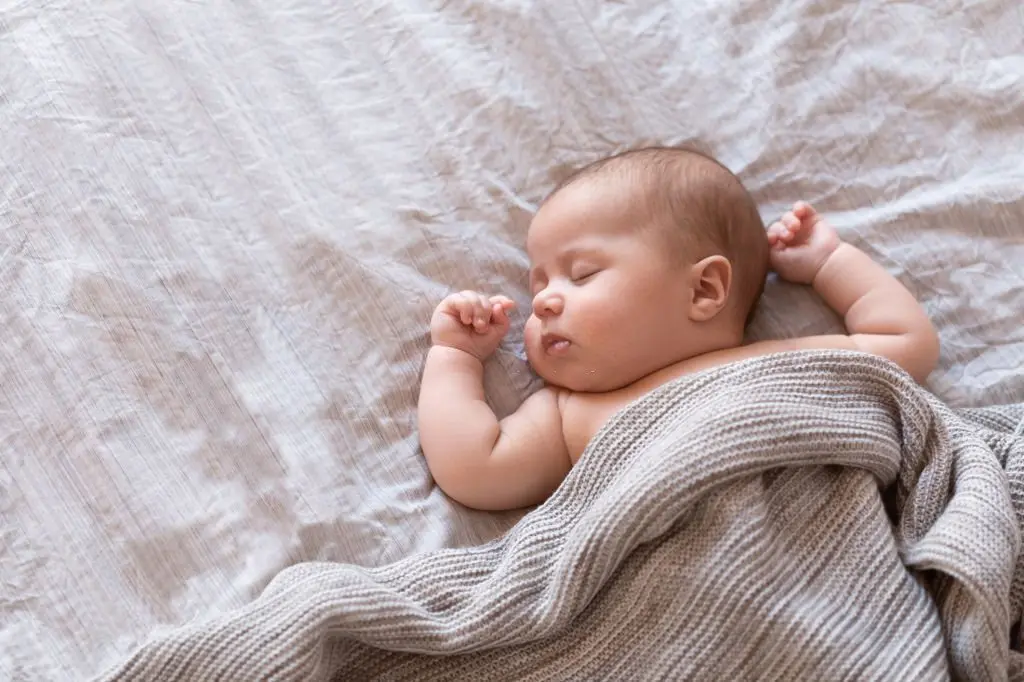
Introduction to how often should baby bedding be changed
As parents, our ultimate goal is to provide our little ones with the utmost comfort and hygiene. One common question that often stumps new parents is, “How often should baby bedding be changed?” In this article, we delve into the depths of this subject, providing you with a definitive guide to ensure your baby’s bedding is always fresh and clean.
The importance of clean bedding
Understanding the need for cleanliness
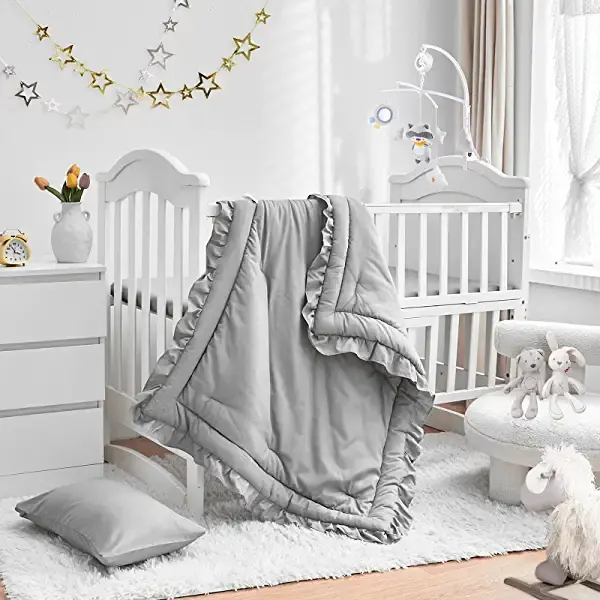
Why should we change the baby’s bedding frequently? Little ones spend a substantial amount of time in their cribs. This is their primary space for sleep, play, and sometimes even meals.
Keeping the bedding clean is essential for maintaining a hygienic environment for the baby, and it also helps to prevent potential health issues like skin rashes and respiratory problems.
Frequency of changing baby bedding: The general rule
Now, let’s address the elephant in the room: “How often should baby bedding be changed?” The simple answer is at least once a week under normal circumstances.
However, this frequency might increase depending on specific situations, which we’ll delve into later in this article.
Factors determining the frequency of bedding changes
Baby’s age
Your child’s age plays a significant role in determining how often you should change their bedding. Newborns, for instance, are more prone to spills, spit-ups, and diaper leaks, requiring more frequent changes – perhaps every few days.
Seasonal changes
Seasons also impact how often you should switch out your baby’s bedding. Sweating could necessitate more regular changes in hot and humid weather, while cooler months might allow for slightly less frequent changes.
Types of baby bedding and their cleaning needs
Toddler sheets
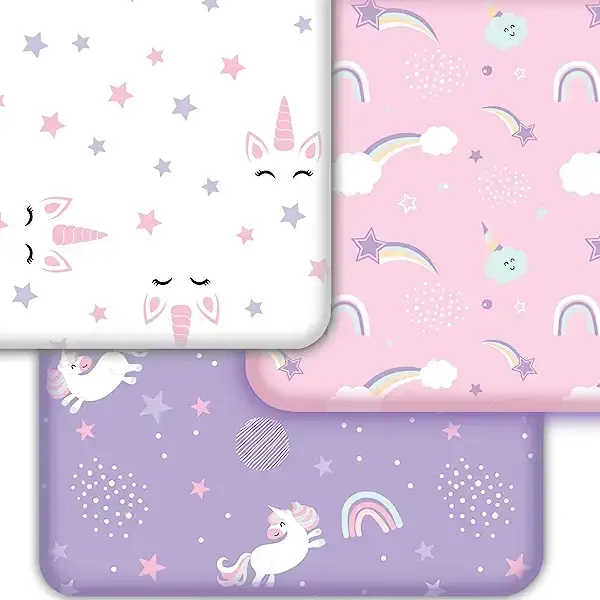
As the name suggests, baby sheets or toddler sheets are the first layer of bedding that comes in contact with your baby. These sheets can accumulate drool, sweat, spilled milk, or even diaper accidents, making it essential to change them regularly.
Changing the cot sheets at least once a week is a good idea. However, if your baby drools a lot or has been wet in night, you might want to change the sheets more often. If there’s any sick or poop on the sheets, washing them immediately is recommended. The NHS recommends washing at a higher temperature of 60 degrees to ensure no dust mites and bacteria are left behind.
Bumper pads
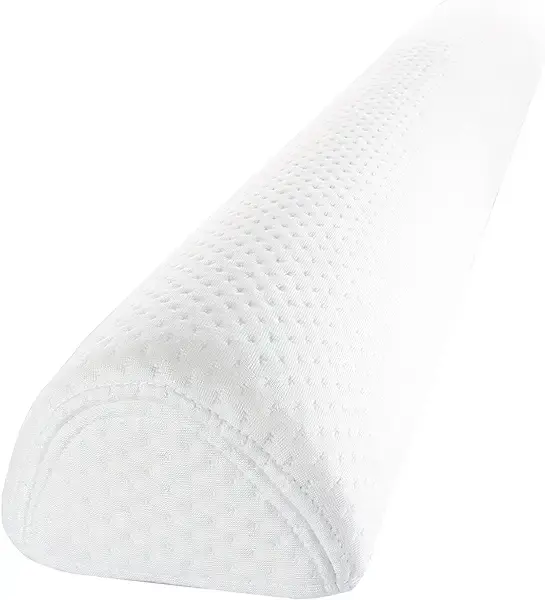
Bumper pads cushion the crib’s inside, protecting your baby from hitting the hard crib sides. However, they can also accumulate dust and dirt over time. It’s recommended to wash bumper pads every three to four weeks or whenever they start to look dirty. However, keep in mind that some safety guidelines recommend against using bumper pads due to the risk of Sudden Infant Death Syndrome (SIDS).
Comforters
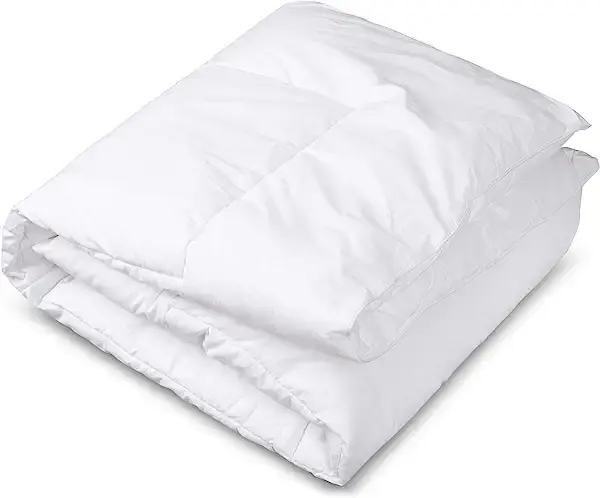
Baby comforters, like other bedding items, can attract dust and dirt. While these don’t need to be washed as frequently as sheets or mattress pads, cleaning them at least every two weeks is a good idea. Again, if there are visible stains or if your baby has been sick, it’s best to wash the comforter immediately.
Pillowcase

While many safety guidelines advise against using pillows for babies under one year due to the risk of SIDS, if you do use one, the pillowcase should be washed at the same frequency as the sheets – at least once a week or more if necessary.
Crib mattress Protectors
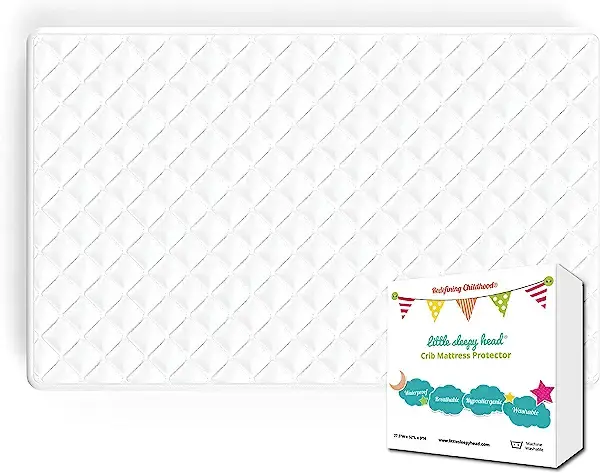
Mattress protectors are designed to shield the mattress from spills and leaks. These should be washed every two weeks or more frequently in case of an accident.
Swaddling blanket
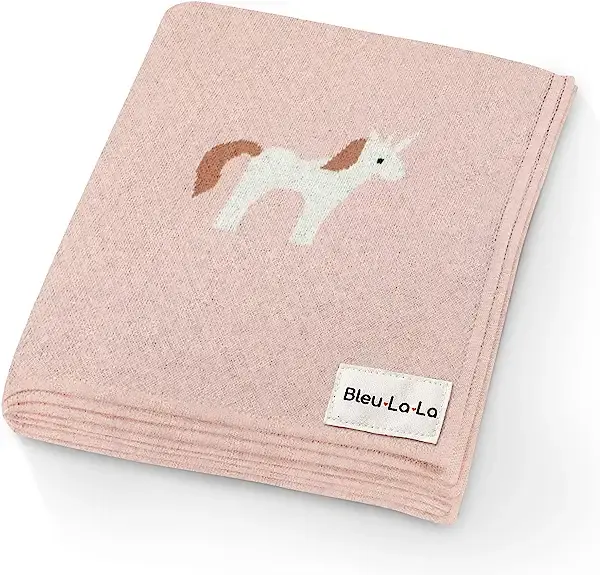
If you use a swaddling blanket for your baby, keeping it clean and fresh is essential. As these blankets are in close contact with your baby’s sensitive skin, washing them frequently and carefully is important. Here are a few tips for caring for your swaddling blankets:
- Pre-treat any stains before washing. Use a laundry stain remover or a simple water and white vinegar solution to work on any tough stains.
- Wash your swaddling blankets separately from other laundry. Use a gentle, non-toxic laundry detergent to keep chemical residues away from your baby’s skin.
- Wash swaddling blankets on a gentle cycle using warm water. Avoid using hot water as it can damage the fabric.
- Avoid using fabric softeners or dryer sheets, which can irritate your baby’s skin. Instead, use wool dryer balls or dryer sheets made specifically for babies.
- Hang the blankets to dry in the sun or tumble dry them in a low-heat setting. Avoid drying them on high heat, as this can damage the fabric and make them rough.
- Store your swaddling blankets in a clean, dry place, away from direct sunlight, insects, and pets.
By following these simple tips, you can keep your baby’s swaddling blankets clean, fresh, and ready to use whenever needed.
Understanding the impact of baby bedding on health
Skin health and clean bedding
“How often should baby bedding be changed?” is also a question of your baby’s skin health. Unclean bedding can lead to rashes and allergic reactions. Regular changes and using hypoallergenic detergents can ensure your baby’s skin remains rash-free.
Respiratory health and bedding
Baby bedding can house dust mites and allergens, leading to respiratory issues. Regular washing of bedding, especially in hot water, can help alleviate this problem.
Steps for changing baby bedding
How to Remove the Bedding
Always start from the top and work your way down. The blanket is removed, followed by the sheets, and finally, the mattress protector.
Washing the Bedding
When washing baby bedding, use a mild, baby-friendly detergent. Hot water can help eliminate any potential allergens or bacteria.
Drying the bedding
Air-drying the bedding is the best method, as it helps to retain the fabric’s softness. However, if this is not possible, opt for the lowest setting on your dryer or line drying.
Line drying is an excellent option, particularly if you have the space and live in an area where clean air will naturally freshen your baby’s bedding. The sunlight can also work to naturally disinfect the material. However, if this isn’t possible for you, using a tumble dryer on a low setting is also acceptable.
Replacing the bedding
When replacing the bedding, start with the mattress protector, followed by the sheets, and finally the blanket. Ensure everything is aligned properly to prevent wrinkles that could discomfort your baby.
Practical tips for managing baby bedding
Always keep a spare set.
Having an extra set of baby bedding can be a lifesaver, especially during unexpected spills or accidents. This allows you to change the bedding immediately without rushing the washing process.
Wash new bedding before use.
Always wash new bedding before using it. Even if the sheets or sleeping bag are brand new, they could still have dust or tiny particles of dirt on them that could irritate your baby’s skin.
Choose Baby-Friendly Detergent
When washing baby bedding, choosing a gentle, baby-friendly detergent is crucial. Avoid strong perfumes and harsh chemicals that could irritate your baby’s sensitive skin.
Conclusion on how often should baby bedding be changed
Understanding “how often should baby bedding be changed” is essential for maintaining your child’s health and comfort. It’s more than just a cleanliness standard; it’s about ensuring a safe, hygienic environment for your baby to grow and thrive. By adhering to these guidelines and tips, you can provide the best care for your child and have peace of mind.
Also Read:
- How to Choose the Right Baby Bedding
- When Should I Start Using Baby Bedding
- What Type of Bedding is Best for a Baby
FAQs on how often should baby bedding be changed
How often do baby sheets need to be washed?
Baby sheets should generally be washed 1 to 2 times per week, and always immediately after any spills or accidents. This is because, although the sheets may look clean, they can harbor dust, dead skin cells, and other potential irritants that could irritate a baby’s sensitive skin.
Do you need to wash baby sheets?
Yes, it is essential to wash baby sheets. Even new sheets should be washed before use, as they can still have dust or tiny particles of dirt on them that could irritate a newborn’s skin.
Are sheets safe for newborns?
Yes, sheets are safe for newborns, provided they are fitted correctly and do not pose a risk of suffocation or entanglement. It’s important to choose sheets that fit the mattress snugly and cannot be easily pulled loose. Sheets made from natural, breathable fabrics like cotton are typically the safest and most comfortable for newborns.
Is baby powder good for sheets?
Baby powder is not typically used on sheets. While it has been used in the past to reduce friction and absorb moisture, its use has become controversial due to health concerns, especially when it contains talc. Inhaling talc can cause respiratory issues. Instead, ensuring sheets are clean and dry is the best way to keep them comfortable for your baby.
What should I use instead of baby powder?
Instead of baby powder, consider using cornstarch-based powders which are a safer alternative. However, it’s still essential to avoid any product that can create a cloud of powder that might be inhaled by the baby. Some parents also use creams or ointments designed to prevent diaper rash as an alternative.
How many times can sheets be washed?
The number of times sheets can be washed depends on the quality of the material. High-quality cotton sheets should withstand many washes, often up to several years of weekly washing. However, signs of wear, such as thinning fabric, fading colors, or fraying edges, indicate it’s time to replace them.
Can I wash baby towels and blankets together?
You can wash baby towels and blankets together, provided they have similar care instructions and colorfastness. It’s important to separate items by color to avoid bleeding and to ensure you’re using the correct water temperature and washing settings for all items in the load. Delicate items may be washed separately or in a laundry bag to prevent damage. Always refer to the care labels on each item.
What kind of detergent should I use for baby sheets?
When washing baby sheets, it’s best to use a gentle detergent that’s free from harsh chemicals and strong perfumes which could potentially irritate your baby’s skin. Some parents choose to use a detergent specifically formulated for babies, but a regular fragrance-free, dye-free detergent should also be safe to use.
Can I use fabric softener on baby sheets?
You can use fabric softener on baby sheets for extra softness, as long as it doesn’t irritate your baby’s skin. The NHS states there’s no evidence that using fabric softeners will irritate a baby’s skin. However, if the baby bedding is treated with flame-resistant chemicals, fabric softener can make these less effective, so always read the care labels first.
Should I iron baby sheets?
Ironing baby sheets is generally not necessary unless you prefer the aesthetic of crisp, wrinkle-free linens. Some parents might choose to iron baby sheets to kill any remaining germs, but regular washing at the recommended temperature should adequately sanitize them.
Can I dry baby sheets in the sun?
Yes, you can dry baby sheets in the sun. Line drying is an option, particularly if you live in an area where clean air will naturally freshen your baby’s bedding. The sunlight can work to disinfect the material naturally. However, not everyone has the space or optimal environment for line drying.
What should I do if my baby has an allergic reaction to the detergent I use?
If your baby has an allergic reaction to a laundry detergent, stop using it immediately. Symptoms of a detergent allergy can include redness, rash, or irritation on areas of skin that come into contact with laundered clothing or bedding. In this case, rewash the items using a hypoallergenic detergent, and consider seeking medical advice if symptoms persist.
How should I store clean baby sheets?
Clean baby sheets should be stored in a dry, cool place away from direct sunlight. A linen closet or dresser drawer is often a good choice. To keep them smelling fresh, you could consider adding a natural scent booster to the storage area, such as a sachet of dried lavender. However, always ensure that any added scents don’t irritate your baby’s skin.
